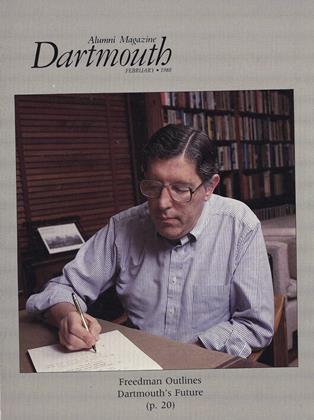Dartmouth has developed many successful writers over the years, and is likely to continue to do so. But it is worth noting that they are not all inspired by the same muse—or write for the same audience. Perhaps there's something in the Hanover climate that gives us a Budd Schulberg, a Dr. Suess, a Louise Erdrich, a Judson Hale.
Consider the following cross-section of one-of-a-kind books that have arrived at the Alumni Magazine.
Writing From Scratch: The Essay, by John Clark Pratt '54, is "a helpful, painless guide to understanding how a piece of expository writing is conceived, structured, written, revised, and rewritten for completeness and excellence." That's what it says on the back cover of this paperback (Hamilton Press, $8.95) written by an English professor at Colorado State University. Inside, in the author's preface, Dr. Pratt announces that he will show the reader how to put an essay together "by having you watch me work, suffer, and struggle with the writing process." He's not kidding. In 130 carefully organized pages of exposition and example and sweat he composes a "personal essay—one that ended up a little more personal than I'd at first intended."
Explaining how to be a better writer ranks somewhere between teaching someone how to be a better lover and how to design a moon rocket—it's not as much fun as the first and could take as long as the second. But if your vocation or avocation is communicating with words, this book is worth adding to your library.
The Mortgage Kit: How to Save $1,OOOsFinancing Your Home by Thomas C. Steinmetz '66 is either a book you better go right out and buy, or one you can postpone acquiring till another day. It depends on your living arrangements. If, as the author says, you're in the market for a house it is likely to be the second-largest purchase you'll make; the largest is your mortgage, which could cost twice your house.
It's not clear whether Steinmetz has read Pratt, but he knows how to organize an essay and he knows his stuff on mortgages. After his Dartmouth degree in mathematics he earned an M.B. A. at Harvard, then worked with Fannie Mae. With interest rates and financial markets being as sensitive as they are, investing an extra $12.95 in the book (Longman Financial Services Publishing) could make you a smarter consumer—Steinmetz's goal.
The Hunt for the Giant Pearl doesn't credit its author on the cover, or anywhere else. That's been the policy at Walt Disney. But Paul S. Newman '45 reports that that has changed and the next Duck Tales book will carry his name. What this book perhaps lacks in character exploration (after all, the characters were defined years ago) is more than compensated for in plot exposition, which moves swiftly from A to B with an appropriate number of twists and developments. Some readers may be bothered by the fact that the tale's sole female character, Magica de Spell, is evil personified, but this Golden Book can be recommended for anyone adult enough not to be bothered by gender defamation.
Newman's curriculum is about as vitae as it gets. He has written for The Lone Ranger, "Laugh In," Lyndon Johnson, Howard Johnson, Ma Bell, and Smokey Bear—among others.
Moving to the sublime, The CatholicClassics by Dinesh D'Souza '83 (Our Sunday Visitor, $6.95) is one man's attempt to summarize "ten of the greatest Catholic works of all time." The degree to which he succeeds is attested to by the fact that the book's preface is by John Cardinal O'Connor and its introduction by William F. Buckley Jr. The former writes, "Not a few Catholics weary of ersazt Catholicism will be refreshed ... Many not of our faith will be quietly gladdened to have available this recollection of what we once believed, and still believe." Buckley states, in part, "What Dinesh D'Souza's remarkable volume does for us is sharply to remind us of the most neglected patrimony in civilization, which is the exegesis of the great minds that devoted themselves as feverishly as any prospector looking for gold to searching out the meaning of God." Theologians may not find themselves absorbed by this slim volume, but they may be well advised to recommend it to lay people who need a refresher on Augustine, Aquinas, Chesterton, Merton, or the others D'Souza includes.
This varied sampling demonstrates a professionalism in which Dartmouth alumni can take considerable pride.
 View Full Issue
View Full Issue
More From This Issue
-
 Cover Story
Cover StoryThe President Makes His Case
February 1988 By James O. Freedman -
 Feature
FeatureTHE HOPEFUL
February 1988 By Peter J. Dorsen '66 -
 Feature
FeatureThe Unmysterious Bible
February 1988 By Nardi Reeder Campion -
 Sports
SportsCelebrating Winter
February 1988 By Tom Corcoran '54 -
 Article
ArticleDartmouth Authors
February 1988 -
 Article
ArticleDartmouth's Black Monday
February 1988
Article
-
 Article
ArticleCapt. Halloran '19 Receives Award
March 1947 -
 Article
ArticleSpecialist in Specs
October 1947 -
 Article
ArticleGive a Rouse
JUNE 1997 -
 Article
ArticleRoller Skates Take to the Woods
MARCH 1994 By Ericka Houck '93 -
 Article
ArticleParent Trap
Jan/Feb 2006 By Judith Hertog -
 Article
ArticleThayer School
November 1954 By WILLIAM P. KIMBALL '29

